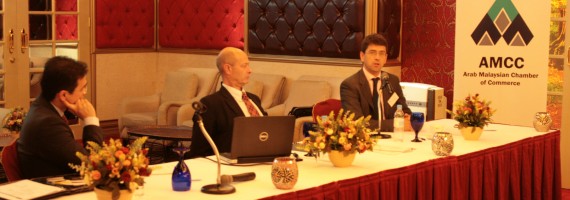4th April 2012 – Interview with Trowers & Hamlins
Malaysia and the Arab World : A legal & practical introspective into overcoming business barriers
The phenomenal and fast paced adoption of entrepreneurs looking at the global market as their own backyard has become the foundation stone of globalization and shrinking barriers. Like the Bedouin, the modern day business is a nomadic entity that creates and adapts to economic behaviors of each of its individual settlements. The spirit of business has become a language of its own, the lingua franca that classifies its structure into analogies such as: risk assessment, equity, market potential, return on investments, service level agreements, payouts and arbitration.
Business across the globe is rapidly adopting towards standardizing its application and approach; however even as economic borders are diluting, cultural and legal ones still exist, – and often, if not understood or applied in context, tend to become barriers to success.
Cultural and legal differences are fundamental elements that need to be understood and addressed, and in response to this demand for diligence, we witness the rise of international consultancies and legal experts. Out of the many thousands of such entities, there are those that stand out, simply due to their achievements, track record and history.
One such firm, Trowers & Hamlins (T&H), a practice whose initial setup can be traced back to over 200 years (1777), has played an incredible role in international representation and arbitration. Having provided their services to heads of state, Sultans, major MNC’s, personalities and many more. The firm has been around since the onset of modern global trade and has grown in tandem, specializing in the Middle East (with over 700 staff located throughout the Middle East, East Asia and England). In 2007, the firm landed the prestigious Law Firm of the Year Award. During the recent Halal Week showcase in Malaysia, AMCC’s secretariat, was fortunate enough to meet and talk with Mr. Majid Al-Toky, T&H’s Resident Managing Partner in Oman, who painted a very interesting and matter of fact picture of navigating the business arena in the middle east and Malaysia:
In conversation Majid Al-Toky, Managing Partner, Trowers & Hamlins, Oman
What`s T&H`s history in the Arab Countries?
In a nutshell The UK law firm went international in Bahrain in 1958, expanded in Oman in the ‘70s and has established its offices in Cairo-Egypt, and Dubai-UAE a decade ago. T&H occasionally reaches from its headquarters to accomplish several project in other Arab Countries, such as Libya, Sudan, Jordan and Yemen. With clients that include Monarchs and heads of state, all the way to Government linked companies as well as Multinational entrants, T&H has established a trusted presence throughout the Arab states.
How about T&H and Malaysia?
T&H has advised the Malaysian Government’s institutions, real estate companies, contractors & engineers, the automotive industry and sundry partners involved in joint ventures in several matters.
Any examples of the type of projects T&H have been involved in?
The wide range of connections that T&H has fostered in both Malaysia and Arab States are extensive. To name some major ones:
Malaysian Governments investment into investment into the US 2 billion dollar Shuabiah Independent Water and Power Project (IWPP) in Saudi Arabia; investment into the Oman real estate sector; advice on construction contracts and disputes in the UAE; taxation and group corporate structures under the Saudi Arabian and Bahrain law; joint ventures and dispute resolution; advice on arrangements need for a multi-national Government-level sukuk directed towards liquidity management”.
What is the standard operating procedure for foreign investors looking for partners in Arab states?
Usually, foreigners visit their Embassy abroad to get a general feeling of the understanding between the two Countries. After that, they inquire on some core issues to assess their legal position (for instance, if the contract is binding, earing and loss risks, what it the structure of the potential partner company). Finally, before approaching the partner, they should deal with the firms of accountants to be fully briefed on financial regulations (taxation, obligations etc.).
There are a lot of complex processes involved. How does T&H facilitate these companies?
It is a consolidated approach, basically T&H assists the foreign investor or entity through the various legal mazes and ensures that all critical points of legal entry are met, following the paved path that due diligence brings about. There are three critical phases that we try to get our clients to consider:
1- Empowerment to connect – i.e. whom to talk to and approaches to dealing with counterparts, endorsements and accreditations.
2- Localization – Cultural awareness, and social empathy are not the only critical protocols that have be considered, fundamentals include established ties and networks to the public and private sectors.
3- Due Diligence & Execution – The chances of failure and reducing opportunity cost will be limited as long as entrants invest into thoroughly getting their due diligence done. A key aspect of doing the due diligence right, is attaining and having access to local perspectives and data, as often fundamentals are diluted when reports are solely done externally. Following that naturally the next step is of course identifying the right partner or representation to setup.
To your experience, what are the most common pitfalls of Asian companies entering the GCC?
It is difficult to find the right channels to initiate a safe and conducive business negotiation; often it is necessary to have patience and move along with the pace of your business environment, especially when starting out. For often a lack of patience has negatively impacted key necessities such as to finding the right project or investor. Even to achieve an ideal and ambitious target – entrants have to start with little steps, something that foreign investors are not completely conscious about. This includes, for instance, dealing with the immigration regulation and procedures; it is extremely helpful to have a consulting and reliable advisory entity to guide you through the intricacies of bureaucracy.
What about the role of Shariah Law?
There are a few issues depending on the specific Arab Country (for instance, regulation on interest, the status of working women), but overall The Shari’a`s aspect does not have a major role on the contractual aspect of doing business. It mostly has to do with the behaviour of the people, their conduct be it in business or social interactions.
What are some of the stereotypes of doing business in Arab Countries?
The Arabs are not all the same, This is a cultural myth that is difficult to eradicate, as it probably originates from the common language spoken, the religion and the often single dimensional portrayal of Arab culture in the mainstream media. The culture, business environment, even the language can vary to a great extent from one Arab Country to the other. This is also a reason why it is particularly important for a foreigner to have a reliable and neutral acquaintance to the local culture. Language is not a problem at all, Especially at the managerial level, the lingua franca of business nowadays is English.
How do you envision the future of Malaysian and Arab business relations?
I see a huge potential for Malaysian and Arab business relations. It is simple, there is a great level of trust for Malaysia from Arab countries, boosted my religious and to some extent cultural similarities, Malaysia is a natural and I might dare say automatic choice for Arabs when it comes to partnerships, joint ventures or even investments. Malaysia has also taken an innovative lead in sectors such as Islamic finance, Halal industry, agriculture and logistics. Along with its stance as a modernising and evolving Muslim majority state, there is a lot of respect for Malaysia. In my perspective there can only be progress when there is respect.
Mr. Majid Al Toky is also the Chairman of the Investment Working Group at the Oman Centre for Investment Promotion and Expert Development, a member of Oman LNG Forum, a board member of OPAL and he is acknowledged as a Leader in the field of Corporate / Commercial in Global Chambers and Partners’ Guide to the Legal Profession 2007.



